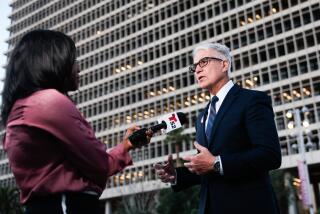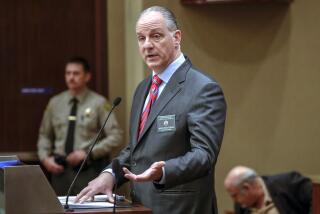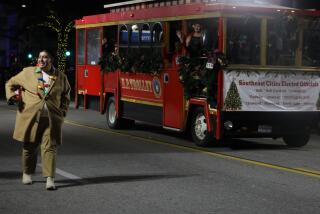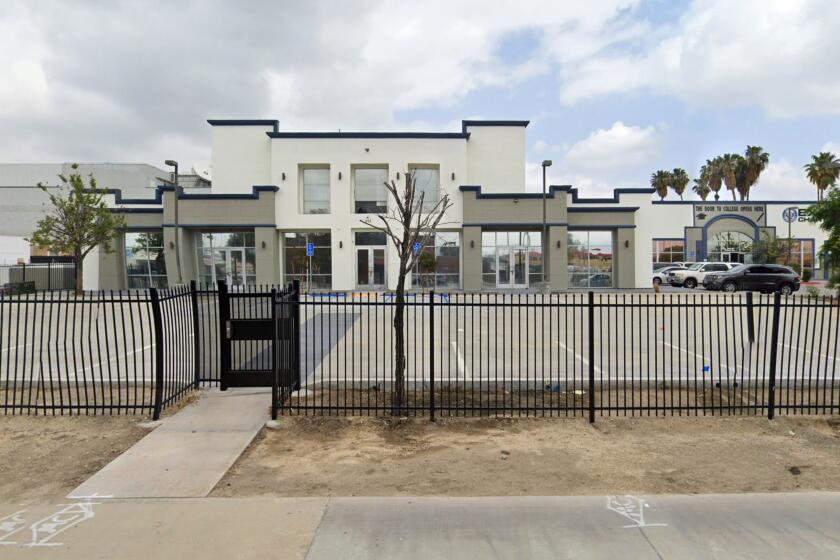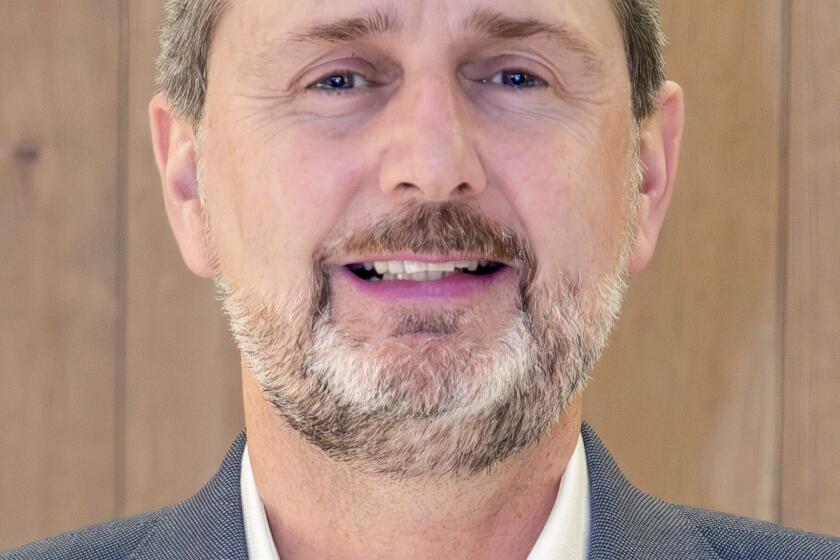Los Angeles County D.A.’s office sees a big drop in the number of public corruption prosecutions
The Los Angeles County district attorney’s public corruption unit has prosecuted hundreds of cases and notched some big convictions, including seven officials who looted city coffers in Bell.
In recent years, however, felony case filings have been on the decline, falling from a high of 39 in 2010 to 11 last year, records show.
Complaints of corruption, the main factor in triggering investigations, are also down, by 28% over the last five years. But figures show that felony prosecutions have declined even more: They’ve dropped by 69% during the same period.
It’s unclear whether the decreases are random fluctuations or signs of a larger change in the way the district attorney handles corruption cases or in the level of misconduct in local government.
Dist. Atty. Jackie Lacey declined requests for an interview. In a statement, she pointed to the drop in complaints as one possible reason for the smaller number of prosecutions. She also said that her office’s work has helped deter corruption.
“This office’s unprecedented and courageous efforts have signaled to those who receive taxpayer money — whether they be elected or appointed officials, government workers, vendors and others — that they will be held accountable if they betray the public’s trust,” Lacey said. “We believe our aggressive stance has resulted in greater compliance and fewer public complaints of corruption.”
Lacey said her office “is one of the few in California and the nation” with staff assigned full time to investigate and prosecute public corruption.
Former Dist. Atty. Steve Cooley won national attention for his prosecutions in several southeast L.A. County cities including Bell, which he famously described as “corruption on steroids.” In that case, officials in the working-class Latino city paid themselves outsize salaries and collected fat pensions while imposing hefty taxes and fees on residents.
Cooley defended Lacey, his longtime deputy who succeeded him in late 2012, saying he has seen no decline in resources dedicated to the unit devoted to prosecuting public corruption, which has 23 prosecutors and investigators. Records from the district attorney’s office show that staffing levels have held steady over the last decade.
Cooley said that turnover in the team’s leadership might have had an effect because institutional knowledge is vital to the unit. Four head deputies have led the team since Cooley left office, staffing records show.
“The change-outs in head deputies over the last four years has created a certain amount of instability,” he said. “That’s probably the factor if I were a betting person.”
In another statement, Lacey said the team’s leadership changes were a result of regular personnel shifts, including promotions, retirements and transfers, and she expressed confidence in those who have led the unit.
“Setbacks in new areas of prosecution are inevitable. Seeking justice requires perseverance,” she said.
When Cooley created the Public Integrity Division in 2001, complaints of corruption poured in, he said.
“What we encountered was a target-rich environment,” Cooley recalled. “It was so pent-up. There were so many very legitimate cases. They were all over the place.”
The unit’s track record under Lacey and Cooley has at times raised questions about how aggressively — and how effectively — it pursues cases involving the misuse of public funds, conflicts of interest and residency laws, and violations of election law and the Brown Act, the state’s open-meeting law.
Cooley was widely lauded for his handling of the 2010 Bell scandal, which followed a series of disclosures in The Times, but his tenure also was marked by criticism of his Public Integrity Division’s selection and prosecution of cases.
Although Cooley prosecuted scores of public officials, he was criticized early on for zeroing in on small targets, such as officeholders in little towns, while not aggressively pursuing major figures in Los Angeles city politics.
Much of that criticism was put to rest in 2008, with the conviction of city commissioner Leland Wong on felony bribery, conflict-of-interest and embezzlement charges. He was sentenced to five years in prison.
The unit does not initiate investigations — it acts on complaints from the public and sometimes pursues allegations reported by news outlets. Last year, 261 complaints were received, down from from 360 in 2012, records show.
District attorney records show the unit investigated a range of public corruption allegations it deemed did not warrant criminal charges. They included accusations that public employees engaged in political activity during work hours, falsified residency records, misused city credit cards and, in the case of one administrator, instructed a secretary to take an online traffic-school exam for him.
Many of those investigated and not charged were little-known public workers, but prosecutors also declined to press charges against some high-profile political players. They include county Supervisor Mark Ridley-Thomas, who spent more than $10,000 in taxpayer money to remodel his converted garage into a home office. In 2014, prosecutors determined the spending was justified.
In February 2016, prosecutors dismissed what was left of the unit’s case against three Irwindale officials who had been accused of lavish spending of taxpayers’ money on meals and Broadway shows on trips to New York more than 10 years ago.
Court records show that a former Irwindale councilman alerted prosecutors in 2005 to the alleged misuse of city credit cards on the trips, which were intended to bolster the city’s bond ratings. The office closed an inquiry a year later but filed charges against four council members in 2010 — but only after the San Gabriel Valley Tribune reported details of the spending. A fifth defendant was indicted in 2011.
The unit’s handling of the case was marred by a series of missteps. An appellate court dismissed an early round of charges after concluding that prosecutors failed to present grand jurors with evidence favorable to the defendants. Then in 2015, a judge ruled that the district attorney’s office blew a deadline to file some charges.
Ultimately, two of the five defendants pleaded guilty to lesser charges and were sentenced to probation. The other three walked free in February 2016 when prosecutors asked a judge to dismiss the case.
The public integrity unit suffered another self-inflicted wound in August, when prosecution blunders in a bribery-and-conspiracy case involving managers of the Los Angeles Memorial Coliseum forced the office to accept no-contest pleas to lesser charges.
The lead prosecutor, Dana Aratani, was removed from the case in 2015 after he acknowledged inappropriately viewing emails between one of the defendants and his lawyer, a violation of attorney-client privilege. Aratani’s replacement, Terrie Tengelsen, later said she had contact with him about the case, despite a promise not to do so.
The mishandling of evidence in the Coliseum case prompted rebuke by Superior Court Judge Kathleen Kennedy, who said the division seemed incapable of handling complex prosecutions.
“You guys are just tripping over your feet and falling on your faces,” Kennedy told two prosecutors at a hearing in the case.
Some complex investigations have spanned years, overlapping the tenures of Cooley and Lacey.
In 2009, after The Times detailed the grip that ex-mayor David Perez’s family businesses had on lucrative City of Industry contracts for trash hauling, street sweeping and other services, the Public Integrity Division launched an investigation. Two years later, prosecutors closed the case, saying they’d found no evidence of wrongdoing.
In May 2015, as part of a city-commissioned review, KPMG auditors examining the same financial relationships found that Perez’s companies had reaped $326 million from city contracts over two decades.
A Perez company had charged six times the going rate for street cleaning and $28 million for vehicle and equipment rentals over 11 years — enough to buy the same machinery several times over, the audit found.
The KPMG findings, subsequently echoed by a state audit, triggered a new investigation by the Public Integrity Division.
Nearly two years later, the case remains “under review,” according to a spokesman for the office.
Times staff writer Marisa Gerber contributed to this report.
ALSO
North Hollywood High team wins national cybersecurity competition
Steve Lopez: California’s environmental crusaders helped save our state. Now, they face down Trump
Congressional bill seeks to prohibit immigration officers from identifying themselves as ‘police’
More to Read
Start your day right
Sign up for Essential California for news, features and recommendations from the L.A. Times and beyond in your inbox six days a week.
You may occasionally receive promotional content from the Los Angeles Times.
